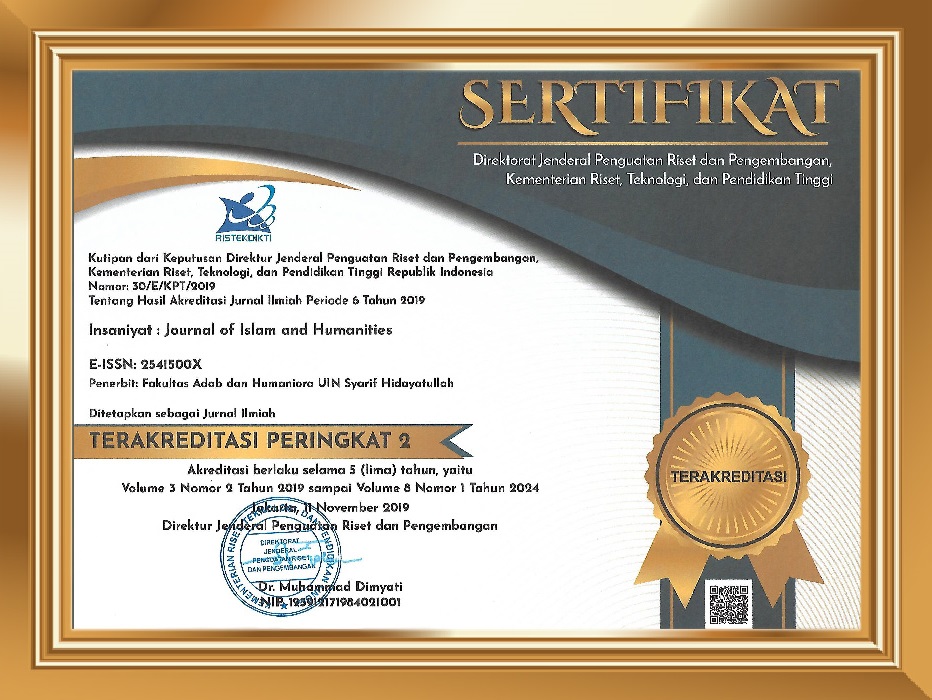The Contributions of Asian Muslims’ Local Wisdom in the Seloko Adat Jambi for Empowering Social Tolerance
Abstract
This article discusses the tolerance values in Seloko Adat Jambi as one of the treasures of
Jambi society. Jambi is known as free conflict area and is classified as a plural society
consisting of various beliefs, ethnic, cultural, and religious schools of thought. The tolerance
of the society is inspired by tolerance values in Seloko Adat Jambi. The aims of this study are
to explore the values of tolerance in Seloko Adat Jambi and to show that these values are
actualized in their social life. This study uses a content analysis method that explores tolerance
values in Seloko Adat Jambi texts. The findings show that empathy, friendliness, and respect
others are derivative values of tolerance in Seloko Adat Jambi. In addition, the actualization of
the values of tolerance is manifested in the ethical awareness of people who tend to respect
others, try to prevent conflicts, resolve conflicts appropriately and thoroughly, and obey the
rules that exist in society. In conclusion, the Jambi people are accustomed to the values of
local wisdom which are full of values of tolerance and respect for others. All of these thoughts
have shaped them into a society that avoid fanatical, extreme, and hostile attitudes.
Keywords
References
Awoniyi, S. (2013). A discourse on religious conflict and tolerance in multi-faith Nigeria. European Scientific Journal, 9(20).
Cools, Arthur. "The Idea of Tolerance and The Perspective of The Individual," Krisis | Journal for Contemporary Philosophy 41 (2):55-56. https://doi.org/10.21827/krisis.41.2.38240.
Chumarina, Victoria. K., "Interethnic conflicts: prevention and reduction by means of intercultural development," Revista Espacios 41, No. 2 (2020), https://www.revistaespacios.com/a20v41n02/a20v41n02p26.pdf.
Dobbernack, J., Modood, T., & Triandafyllidou, A. (2013). Advances on tolerance theory in Europe.
Doorn, Marjoka van. "The Nature of Tolerance and The Social Circumstances in Which it Emerges," Current Sociology (October 2014): 1, DOI: 10.1177/0011392114537281
Effendi, Tonny Dian. "Local Wisdom in Tolerance Building between Ethnic Chinese and Other Ethnics in Indonesia Advances in Social Science," Education and Humanities Research, Vol. 271 (February 2019): https://www.atlantis-press.com/article/125911197.
Ehrkamp, P. (2010). The limits of multicultural tolerance? Liberal democracy and media portrayals of Muslim migrant women in Germany. Space and Polity, 14(1), 13–32.
Elo, Satu & Helvi Kynga ̈ s, (2008) "The qualitative content analysis process," JAN Research
Methodology (November, 2007):
Fathuri, A. K. dan. (2016). Toleransi Beragama di Daerah Rawan Konflik. Puslitbang Kehidupan Keagamaan.
Gafar, A. (2012). Peranan Seloko Dalam Upacara Adat Perkawinan Masyarakat di Kota Jambi. Pena, 2(3). https://online journal.unja.ac.id/index.php/pena/article/view/1441.
Haryanto, J. T. (2013). "Kontribusi Ungkapan Tradisional dalam Membangun Kerukunan
Beragama." Walisongo: Jurnal Penelitian Sosial Keagamaan 21, No. 2, 365-392. https://doi.org/10.21580/ws.21.2.250.
Kamil, Muhammad. "Cultural Tolerance, Diversity and Pluralism: The Recognition of Yogyakarta as the City of Tolerance," LOGOS 1. No. 1. 86-106, http://10.0.86.203/LOGOS.Vol1.No1.86-106
Lee, S. (2015). Membangun Perdamaian di Korea yang Terpecah Dua. In D. Fortuna (Ed.), Konflik Kekerasan Internal, Tinjauan Sejarah, Ekonomi, Politik dan Kebijakan di Asia Pasifik. Yayasan Obor Indonesia.
Lembaga Adat Propinsi Jambi, Pokok-pokok Adat Pucuk Jambi Sembilan Lurah: Sejarah Adat Jambi, Jilid 1. Jambi: Pemprop Jambi, 2003.
Munawir, A. W. (1995). Kamus Arab Indonesia al-Munawir. Pustaka Progressif.
Powell, R., & Clarke, S. (2013). Religion, tolerance and intolerance: Views from across the disciplines. Religion, Intolerance and Conflict: A Scientific and Conceptual Investigation, 2–36.
Rossi, Enzo. "Can Tolerance Be Grounded in Equal Respect?" European Journal of Political Theory (March 2013), DOI: 10.1177/1474885112465246.
Serin, Hamdi. (2017). "Teaching about Respect and Tolerance with Presentations on Cultural Values," International Journal of Social Sciences and Educational Studies 3 (4):174-176, DOI:10.23918/ijsses.v3i4p174.
Suradi, Ahmad, John Kenedi, Buyung SUrahman, "Religious Tolerance in Multicultural Communities: Towards a Comprehensive Approach in Handling Social Conflict,"
Udayana Journal of Law and Culture 4, No. 2 (July 2020), 229-245,
https://ojs.unud.ac.id/index.php/UJLC/issue/view/3600
Tolerance, [Def. 1]. (n.d.). Merriam-Webster Online. In Merriam-Webster. Retrieved January 2, 2018, from http://www.merriam-webster.com/dictionary/tolerance.
Toleran (2017) in the big Indonesian Dictionary. Retrieved from https://kbbi.web.id/toleran.
Verkuyten, Maykel and Rachel Kollar. "Tolerance and intolerance: Cultural meanings and discursive usage," Culture & Psychology 27, No. 1 (2021): DOI: 10.1177/1354067X20984356
Zick, A., Küpper, B., & Hövermann, A. (2011). Intolerance, prejudice and discrimination-A
European report.
DOI: 10.15408/insaniyat.v7i1.25371
Refbacks
- There are currently no refbacks.







